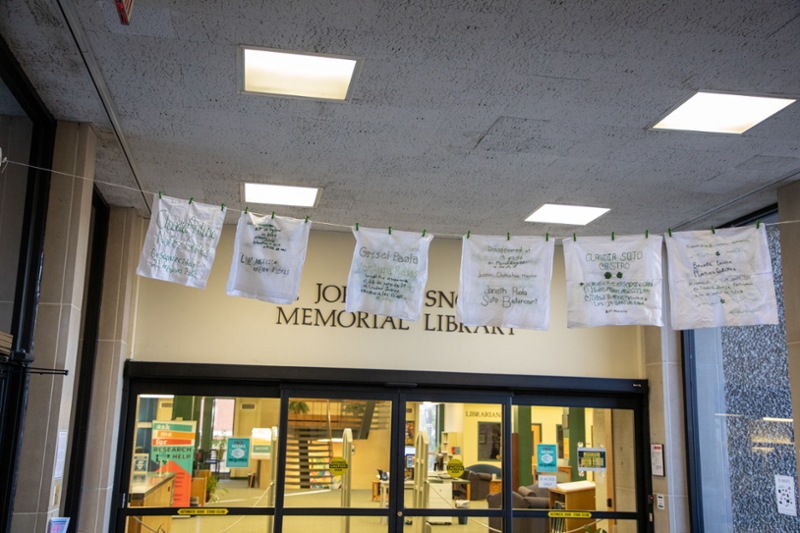
Download Image: Web
Lycoming College art history students drew attention to the “Adopta a un desaparecidx” (Adopt a Disappeared Person) cause by working publicly on embroideries that remember victims of femicide in Mexico. The project comes as the broader campus community works to raise awareness of domestic violence. There will be an installation of the Bordeamos por la Paz project from Nov. 2-23 on the main floor of Snowden Library.
Art and Politics in Latin America (ARHI 253) is the study of some of the most pivotal works of recent Latin American art created in tandem with, and often in direct response to, key moments of revolution, dictatorship, uneven development, and social upheaval in the region from roughly the 1960s to today. On Sept. 28, students enrolled in the course gathered outside the Wertz Student Center to work on the embroidery project together. The assignment consists of embroidering two cloth panels to memorialize disappeared Mexican women in Ciudad Juárez, Mexico. Something particularly unique about this project is the requirement that it be completed collectively in a public setting, ideally where there is a large amount of foot traffic.
“This project was extremely emotional to work on,” commented Valeria Rivera, a student enrolled in ARHI 253. “Once I internalized that the person I was assigned is not just a name on paper but a life that was lost, I couldn’t help but to get emotional every time I embroidered. However, I am proud of the work we created. Femicide is an important issue that not enough people are talking about, so I am glad we were able to start that conversation at Lycoming.”
Erin L. McCutcheon, assistant professor of art history and instructor for ARHI 253, partnered with the Mexican feminist art collective, Bordeamos por la Paz, an organization that works directly with the mothers of disappeared Mexican women in Ciudad Juárez to memorialize their daughters and advocate against the indifference toward femicide that exists in Mexico. Bordeamos por la Paz believes in creating a community that is just and compassionate, which is why volunteers are only given the names of the women and their disappearance dates. This is meant to stress the importance of their lives as worthy members of society rather than achieving that compassion through their life’s work or life circumstances.
“I was first introduced to Bordeamos por la Paz by a colleague, Corrie Boudreaux, who studies memorial practices and politics on the U.S./Mexico border,” said McCutcheon. “Corrie had done a similar version of the project with students in her Latin American Studies course but had not considered it from an art historical perspective.
“My personal research centers on the ways women, particularly those in Latin America, have used art to create social and political change. This project engages with so many aspects the material we are studying this semester, but, more importantly, it gives students a hands-on encounter with artmaking and real-world issues that extend beyond the classroom. What I find so exciting about art is its ability to create meaningful moments of connection between disparate groups of people that might have lasting positive effects for the viewer and society.”
Students enrolled in ARHI 253 were required to create two hand-embroidered panels (one in English and another in Spanish) using the materials that were provided to them. The class is supposed to work in similar methods as Bordeamos por la Paz by working collectively in public spaces before their installation. While students were allowed to work on the project on their own, they are strongly encouraged to always embroider in public spaces to start a conversation about their importance with their peers.
To learn more about Bordeamos por la Paz or to read McCutcheon’s and Boudreaux’s paper on the project, click on: https://www.facebook.com/BordEamosPaz/ or https://revistas.uniandes.edu.co/doi/pdf/10.25025/hart06.2020.11.